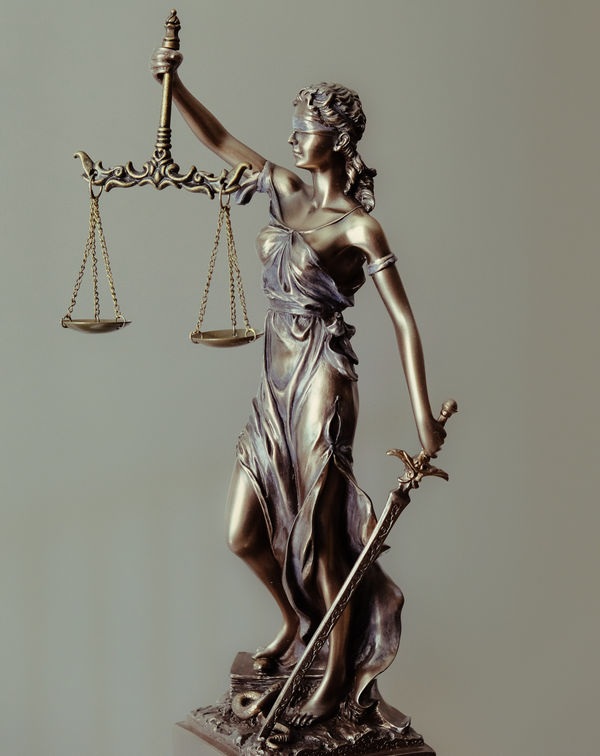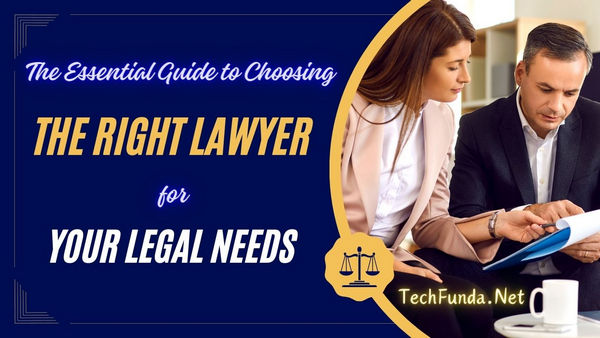Introduction
Welcome to our essential guide on choosing the right lawyer for your legal needs! When faced with a legal issue, finding the perfect attorney can be a daunting task. After all, this is someone who will be representing your interests and guiding you through complex legal processes. With so many lawyers out there, how do you know which one is the right fit for you?
Fear not! In this comprehensive guide, we will walk you through everything you need to consider when selecting a lawyer. From understanding your specific legal requirements to researching potential candidates and evaluating their suitability, we’ve got you covered.
Whether it’s a divorce settlement, personal injury claim, or drafting important contracts for your business – making an informed decision about legal representation is crucial. So let’s dive in and empower ourselves with the knowledge needed to make the best choice possible.
Remember: Choosing the right lawyer can make all the difference between success and disappointment in resolving your legal matters. Let’s get started on this exciting journey of finding that perfect match.
Understanding Your Legal Needs
When it comes to choosing the right lawyer for your legal needs, it is crucial to have a clear understanding of what those needs actually are. The first step in this process is to identify the specific area of law that pertains to your situation. Are you facing a criminal charge? Do you need help with estate planning or business contracts? Perhaps you require assistance with immigration issues or family law matters.
Once you have determined the general category of law that applies to your case, it’s important to delve deeper and consider any unique circumstances or complexities involved. For example, if you are dealing with a personal injury claim arising from a car accident, you may want to find an attorney who specializes in both personal injury and auto accidents.
Additionally, take into account the desired outcome of your legal matter. Are you seeking financial compensation? Do you need someone who can negotiate on your behalf? Or maybe you simply require guidance and advice throughout the process.
By clearly defining and understanding your legal needs, not only will it be easier for potential lawyers to evaluate whether they can assist you effectively but also ensures that their expertise aligns with what exactly is required in order for them provide effective representation tailored specifically towards achieving favorable outcomes.

Researching and Evaluating Potential Lawyers
Researching and evaluating potential lawyers is a crucial step in finding the right legal representation for your needs. With so many options available, it’s important to do your due diligence and gather as much information as possible before making a decision.
Start by seeking recommendations from trusted sources such as friends, family, or colleagues who have had positive experiences with lawyers in the past. They can provide valuable insights and help narrow down your choices. Additionally, online resources like lawyer directories and review websites can offer further guidance.
Once you have a list of potential candidates, take the time to thoroughly research each one. Look into their backgrounds, experience, and areas of specialization. Consider checking their website or online profiles for testimonials or case studies that showcase their expertise.
Next, evaluate their reputation within the legal community. Check if they are members of professional organizations or have received any awards or recognition for their work. This can give you an idea of their standing among peers and indicate a level of professionalism.
It’s also important to consider practical factors such as location and availability when researching potential lawyers. You want someone who is accessible to you geographically and will be able to dedicate sufficient time and attention to your case.
In addition to gathering information about potential lawyers on paper (or screen), don’t underestimate the value of an initial consultation. Use this opportunity to ask questions about their approach to cases similar to yours, how they communicate with clients, what fees they charge, etc.
Remember that chemistry between you and your lawyer is essential; trust your instincts during these meetings! A good lawyer-client relationship requires open communication channels where both parties feel comfortable sharing information freely.
Lastly but not least importantly: specialization matters! Different legal issues require different skills sets – always prioritize attorneys who specialize in relevant areas of law rather than general practitioners!
By conducting thorough research combined with face-to-face consultations with prospective lawyers – all while keeping in mind factors such as reputation specialization – you’ll be well on your way to finding the right lawyer for your legal needs. So take your time, and don’t be afraid to ask questions – after all, you want to ensure that your case is in the best hands possible.
Factors to Consider When Choosing a Lawyer
When it comes to choosing the right lawyer for your legal needs, there are several important factors that you should take into consideration. First and foremost is experience. You want a lawyer who has extensive experience in handling cases similar to yours. This will ensure that they have the knowledge and expertise necessary to effectively represent you.
Another factor to consider is reputation. It’s essential to choose a lawyer with a good reputation in the legal community. Look for reviews and testimonials from past clients, as well as any accolades or recognition they may have received.
Communication is also key when selecting a lawyer. You want someone who will be responsive and keep you informed throughout the process. A lawyer who takes the time to listen to your concerns and explain things clearly can make all the difference in your experience.
Cost is another important factor to consider, but it shouldn’t be the sole determining factor. While affordability is certainly important, remember that quality legal representation often comes at a higher price. Be sure to discuss fees upfront and ask about payment options or potential alternative arrangements.
Trust your instincts when making this decision. Meet with potential lawyers for an initial consultation and gauge how comfortable you feel working with them. Trusting your gut instinct can help ensure that you choose someone who not only has the necessary skills but also fits well with your personality and communication style.
By considering these factors carefully, you can increase your chances of finding the right lawyer who will best meet your specific legal needs. Remember, choosing an attorney is an important decision – take the time needed before making your final choice.
Questions to Ask During the Initial Consultation
During the initial consultation with a potential lawyer, it’s crucial to ask the right questions in order to determine if they are the right fit for your legal needs. Here are some important questions to consider:
1. Experience: Ask about their experience handling cases similar to yours. Find out how long they have been practicing law and their success rate in similar situations.
2. Strategy: Inquire about their approach and strategy for your specific case. Understanding how they plan to handle your legal matter will help you assess their expertise and compatibility.
3. Communication: Discuss communication expectations upfront. Ask how often you can expect updates on your case and what method of communication they prefer (phone calls, emails, etc.).
4. Fees: It’s essential to understand the lawyer’s fee structure from the beginning. Ask about billing rates, whether they charge hourly or offer flat fees, and any additional costs or expenses that may arise during your case.
5. Timeline: Get an understanding of the expected timeline for resolving your legal matter. While exact timelines can be difficult to predict, having a general idea will help manage expectations.
Remember that this is just a starting point – feel free to ask any additional questions that pertain specifically to your situation or concerns you may have.
Cost and Payment Options
When it comes to legal services, cost is undoubtedly a significant factor to consider. Hiring a lawyer can be expensive, so it’s crucial to have a clear understanding of the potential costs involved before making your decision.
It’s important to research lawyers who offer transparent pricing structures. Some may charge an hourly rate, while others may work on a fixed fee basis for specific services. Understanding their billing methods will help you assess whether they align with your budget and financial capabilities.
Additionally, inquire about any additional expenses that may arise during your case. This could include court fees, filing fees, or costs associated with gathering evidence or hiring expert witnesses. Being aware of these potential expenses upfront will prevent any surprises down the line.
Another aspect to consider is payment options. Some lawyers may require an upfront retainer fee before commencing work on your case. Others might offer flexible payment plans or contingency-based arrangements where they only get paid if they win your case.
Remember that cheaper isn’t always better when it comes to legal representation. While cost is important, prioritize finding a lawyer who has the experience and expertise necessary for your particular legal needs.
Open communication about costs and payment options from the outset will ensure you are well-prepared financially throughout the duration of your case.
Communication and Trust in a Lawyer-Client Relationship
Clear and effective communication is crucial in any lawyer-client relationship. When choosing a lawyer, it’s important to consider their ability to communicate effectively with you. Open lines of communication ensure that your needs are understood and addressed appropriately.
A trustworthy lawyer will take the time to listen attentively to your concerns, ask relevant questions, and provide clear explanations about legal processes and options available to you. They will keep you informed at every stage of your case, providing updates on progress or any new developments.
Moreover, trust is an essential component of a successful lawyer-client relationship. You should feel comfortable confiding in your attorney regarding sensitive information related to your case. A reliable lawyer will maintain confidentiality while demonstrating empathy towards your situation.
Effective communication also means that your attorney promptly responds to emails or phone calls within a reasonable timeframe. This shows their dedication and commitment to addressing any urgent matters or concerns that may arise during the course of handling your legal needs.
By establishing good communication and building trust with your chosen lawyer from the start, you can work together more efficiently towards achieving the best possible outcome for your legal matter.
The Importance of Specialization
When it comes to choosing the right lawyer, one of the most crucial factors to consider is their specialization. Just like doctors, lawyers have different areas of expertise. It’s essential to find a lawyer who specializes in the specific legal matter you need assistance with.
Why is specialization important? Well, think about it this way: if you were facing criminal charges, would you want a lawyer who primarily handles real estate transactions? Of course not! You’d want someone well-versed in criminal law and experienced in defending clients in similar situations.
Specialized lawyers have an in-depth understanding of the laws and regulations pertaining to their area of practice. They stay updated on any changes or new developments that could impact your case. This knowledge and experience can make all the difference when it comes to navigating complex legal issues.
Furthermore, specialized lawyers often have established relationships within their field. They may have connections with judges, prosecutors, or other professionals relevant to your case. These relationships can be valuable assets when negotiating or advocating on your behalf.
By choosing a specialized lawyer, you’re giving yourself the best chance at achieving a favorable outcome for your legal matter. So don’t underestimate the importance of finding a lawyer who focuses specifically on your type of case; it could significantly impact the trajectory and success of your legal journey.
Checking for Complaints or Disciplinary Actions
When it comes to choosing the right lawyer, you want to ensure that they have a good reputation and a clean disciplinary record. Checking for any complaints or disciplinary actions against potential lawyers is an essential step in the decision-making process.
Start by researching online resources such as state bar association websites, which often provide information about any disciplinary actions taken against attorneys. Look for any serious infractions or patterns of misconduct that could indicate a lack of professionalism or ethical behavior.
Additionally, consider reading client reviews and testimonials on reputable legal directories and review platforms. While individual experiences may vary, paying attention to common themes can give you insight into how the lawyer interacts with clients and handles cases.
Another valuable resource is personal referrals from friends, family members, or trusted professionals who have worked with lawyers in the past. They can share their firsthand experiences and provide recommendations based on their satisfaction with the attorney’s services.
Remember that finding one complaint does not necessarily mean you should dismiss a lawyer entirely. However, multiple complaints or severe violations should raise red flags and make you think twice before proceeding.
By conducting thorough research and checking for any complaints or disciplinary actions against potential lawyers, you can make an informed decision while minimizing your risks. A reliable and trustworthy attorney will have a professional track record that aligns with your expectations of quality representation.
Making the Final Decision
Making the final decision on which lawyer to choose is a crucial step in your legal journey. After conducting thorough research and evaluating potential lawyers, it’s time to weigh all the factors and make an informed choice.
Consider their experience, expertise, and track record. Look for attorneys who have successfully handled cases similar to yours. This shows that they understand the intricacies of your specific legal issue and can provide effective representation.
Next, take into account their communication style. A lawyer who actively listens to your concerns, explains complex legal concepts in plain language, and promptly responds to your queries can make a significant difference in your overall experience.
Trust is another vital factor when making this decision. You need to feel comfortable discussing personal matters with your lawyer and believe that they have your best interests at heart. Trusting their judgment will allow you to work together more effectively towards achieving a favorable outcome.
Additionally, consider the cost of hiring the lawyer. While it’s important not to base your decision solely on price, you should ensure that their fees align with what you are willing and able to pay. Don’t hesitate to discuss payment options or inquire about any potential additional costs upfront.
Trust yourself when making this decision. Your instincts often play a significant role in determining whether someone is the right fit for you or not. Take note of how comfortable you felt during consultations or conversations with each attorney and go with your gut feeling.
Remember that choosing the right lawyer may require some time and effort but finding someone who understands your needs can greatly impact the outcome of your case.
Conclusion
Choosing the right lawyer for your legal needs is a critical decision that should not be taken lightly. By understanding your legal needs, researching and evaluating potential lawyers, considering factors such as specialization, communication, and trust, checking for complaints or disciplinary actions, and asking the right questions during the initial consultation, you can make an informed choice.
Remember that cost and payment options are important considerations, but they should not be the sole determining factor in selecting a lawyer. It’s crucial to find someone who not only has the expertise to handle your case but also makes you feel comfortable and confident throughout the process.
By following this essential guide to choosing the right lawyer for your legal needs and taking into account all relevant factors discussed above, you will increase your chances of finding a lawyer who can effectively represent you and achieve a successful outcome.
So take your time when making this important decision. Conduct thorough research and consider multiple options before making up your mind. Remember that finding the right lawyer can make all the difference in resolving your legal issues efficiently and effectively. Good luck with your search.

